I understand that most people pay little attention to politics. If they vote, those people are called “low information voters”. But there are other people that aren’t exactly “low information”, they are more like “wrong information”. They think they know things, but those things are just plain wrong.
A prime example of this is a recent national poll from Public Policy Polling. They asked Republicans if they think that Barack Obama was born in the US. Only 29% said yes, while 44% said no, and 26% were not sure. They also asked Republicans if they think Ted Cruz was born in the US, and 40% said yes, while 22% said no, and 39% weren’t sure. The only problem is that Ted Cruz freely and publicly admits that he was born in Calgary, Canada. Showing this graphically:
I know where these people get the idea that Obama was not born in the US, even though there has never been any actual evidence to the contrary. So it is annoying, but not totally surprising that Obama has been president for almost 7 years but less than a third of Republican voters believe he was born in the US. But how can these people believe that Cruz was born in the US?
Likewise, 54% of Republicans believe that Obama is not a Christian, while 32% aren’t sure, which means that a whopping 86% of Republicans are skeptical of the president’s actual faith.
In the interest of being fair and balanced, another poll shows that partisan influence is not confined entirely to Republicans.
The 2013 poll asked people their opinion about repealing the 1975 Public Affairs Act. The trick is that there is no 1975 Public Affairs Act, it was completely made up. But the question was phrased three ways.
When phrased as “Some people say the 1975 Public Affairs Act should be repealed. Do you agree or disagree?”, the results were as follows:
Fewer Democrats agree with the statement than Independents or Republicans, but the results are not statistically significant.
But now look at the alternative phrasings, which injected partisan information. Some people were asked “President Obama says the 1975 Public Affairs Act should be repealed. Do you agree or disagree?” and others were asked “The Republicans in Congress say the 1975 Public Affairs Act should be repealed. Do you agree or disagree?”. The opinions were dramatically different:
When Obama said it, 39% of Republicans disagreed with him, while only 13% of Democrats agreed. But when Republicans in Congress said it, then 28% of Democrats disagreed, while 20% of Republicans agreed. This shows that Republicans are more easily swayed by partisan arguments: 39% swayed against something if Obama says it, while 20% swayed for it if Republicans in Congress say it. Democrats were still affected by partisanship, with 28% swayed to be against something if the Republicans in Congress say it, and 13% swayed to be for something if Obama says it.
But the interesting conclusion is that a significant number of voters of both parties are willing to express an opinion about an issue they know nothing about (indeed, could not know anything about because it was made up for the poll).
But what about real issues? A new poll tries to answer that question.
In the new poll, respondents were asked about universal health care, Social Security, the Iran nuclear deal, and affirmative action. Half the respondents were told that Donald Trump supported these issues. The other half was told that either Obama, John Kerry, or Hillary Clinton supported the same issues.
For example, universal health care:
It is true that both Obama and Trump have publicly praised universal health care. But the survey response depended heavily on whether the question attributed Obama or Trump as praising it. Unsurprisingly, if Trump praised it Democrats were less likely to support it, while Republicans were more likely.
The results were similar for Affirmative Action:
For Social Security, there was less partisan influence, showing that there is strong support for protecting Social Security among both Democrats and Republicans, although both were somewhat influenced by whether it was Hillary Clinton or Donald Trump who said it.
Finally, the results for the Iran Nuclear Deal was interesting:
Democratic support for the Iran deal went up slightly (from 52% to 54%) when told that Trump opposes ripping it up. Maybe a few Democratic voters were convinced if even Trump doesn’t want to rip it up. But Republican support went from 20% when told Kerry opposes ripping up the deal to a slight majority of 53% when told that Trump opposes ripping up the deal.
I suppose the Iran Nuclear Deal is more influenced by partisan support because there are few voters who would know enough about the details of the deal to actually have an opinion whether it is a good deal to sign or not. So people have to depend on who supports it and whether they like that person.
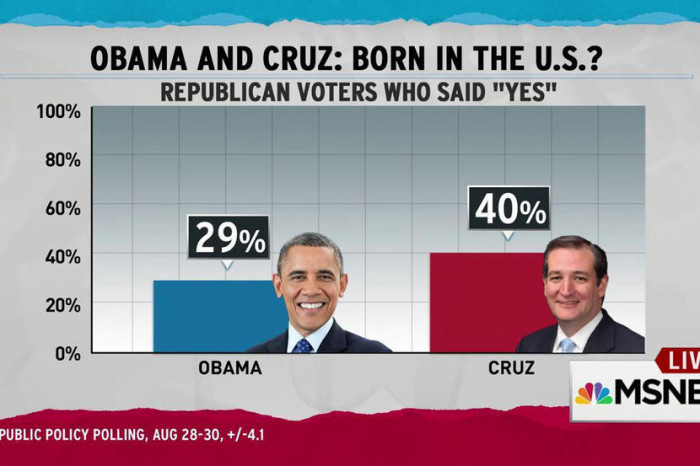
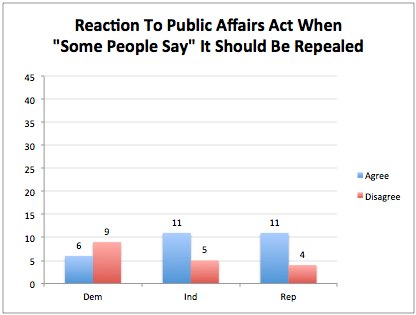
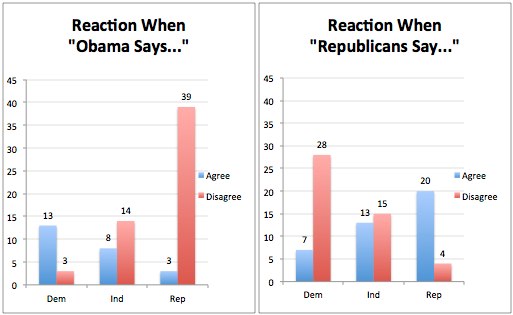
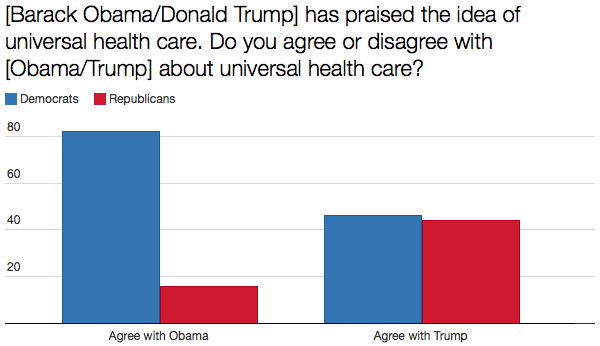
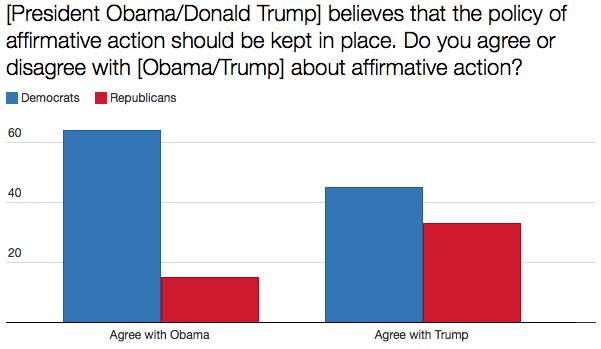
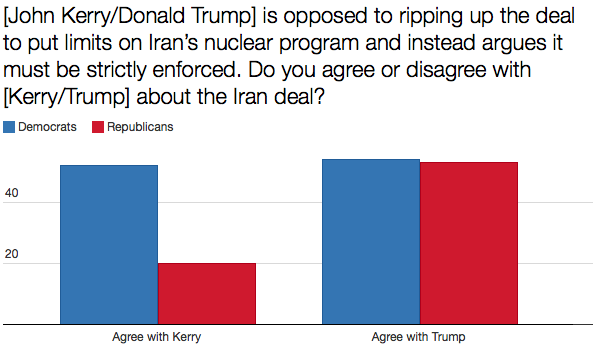


5 Comments
Actually, there has been proof that Obama was born in Hawii — before it was part of the US
http://abcnews.go.com/Politics/obama-birth-hawaii-gov-proof-presidents-birth-certificate/story?id=12721552
I’m not sure these are really legitimate questions. If someone asked me if I agreed with Donald Trump that affirmative action should be kept in the workplace, I do think it should be kept, but that doesn’t mean I agree with Donald Trump, who may have designs on its modification.
That survey perfectly illustrates the biggest problem in American politics: many citizens are either incapabale or unwilling to form an opinion not shared with their party leadership.
RK, your link shows Obama was born in 196`. It is easily confirmed that Hawaii became a state in 1959, and was US territory more than 150 years before that.
Barack Obama’s mother was born in Kansas and was an American citizen. Children born to American parents, whether born in the United States or its territories or not, automatically qualify for citizenship. According to the U.S. Citizenship and Immigration Services, http://www.uscis.gov/us-citizenship/citizenship-through-parents
Ted Cruz is as much a natural-born American citizen as Barack Obama.
Redjon, the question didn’t ask if he was an American citizen, it just asked if he was born in the US.